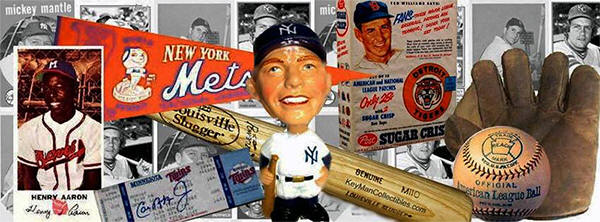|
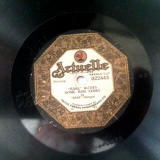 |
|
Babe Ruth Home Run Story |
|
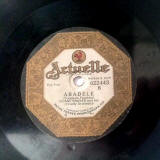 |
| Fox trot titled Abadele |
|
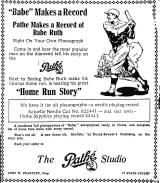 |
| Babe Ruth Home Run Story 1920
Newspaper Ad |
|
| Sapphire playing Record |
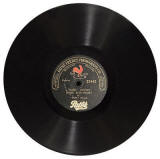 |
| Babe Ruth's Home Run Story
late release variation label |
|
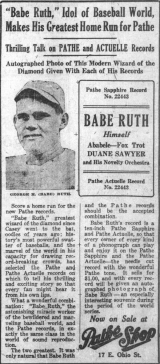 |
| Indianapolis News October 1920 |
|
|
|
|
|
| |
The Babe Ruth Home Run Story Pathe' Actuelle 78
RPM Record |
|
| |
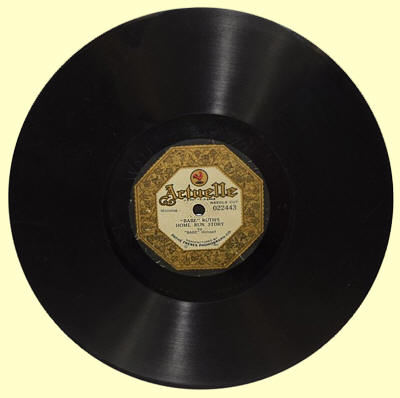 |
|
The
Babe Ruth Home Run
Story Pathe Actuelle 78
Record |
|
|
Item Details |
-
CIRCA
- 1920
-
MANUFACTURER
-
Pathe Freres
Phonograph Co.
-
SPEED -
78 RPM
-
RECORD SIZE -
10"
-
PRICE GUIDE
- $75.00 - $150.00
Excellent -
Near Mint Condition
|
|
|
|
| |
|
|
| |
The "Babe Ruth's Home Run Story" 78 rpm
record was released by the Pathe Freres
Phonograph Co., Brooklyn NY, in 1920 on
the Actuelle record label. Side one
features a monologue (spelled monolog
on the label) of an actual recording by
"Babe" himself, titled "Babe Ruth's
Home Run Story." Side "B," a fox trot
titled "Abadele" performed by Duane
Sawyer, and his Novelty Orchestra. The
label has a 1920 copright.
The record was first made available in 1920 at any Pathe Records dealer or
by using a coupon featured in a number
of magazine advertisements, "clip the
coupon and mail it to" Pathe Freres
Phonograph Co. 20 Grand Avenue,
Brooklyn NY." with a dollar pinned to
it." The Babe Ruth record came with "one
photographic print of his autographed
photograph Free"
The 7” x 9-1/4” "White Studio, NY, black & white premium photo issued by
the Pathe Freres Phonograph Co.
features Babe Ruth in a standing pose
and his inscribed facsimile autograph
"Sincerely Yours Babe Ruth" The back
has a full record listed by date, of
all of the home runs hit by Ruth in
1920, up
until September 13, including
opposing team, pitcher, stadium and how
many men were on base. The header of
the chart reads " Babe Geo. H. Ruth,
Born Baltimore, Md., Feb. 7, 1894,
Height, 6 ft. 2 in., Weight 198lbs.
1920 Home Runs." The bottom right
feature the Pathe logo centered between
"Complements of" and
Pathe Freres Phonograph Co., Brooklyn
NY.
It is believed by many people that
Listen to the record that it is not
the voice of Babe Ruth. It was stated
"Listening to the recording will make
it immediately clear that the voice is
not that of the Babe." This statement
is based on an opinion by someone that
apparently did little research, other
than to listen to the record.
Many people picked up on it. There is no
indication on the record or in any of
the advertisements that it is anyone
but the Babe. The Saturday Evening Post
advertisement states that the "Home Run
Monarch idol of the baseball
public......came to the Pathe
Laboratory and made a Pathe Actuelle
record...it's a great record by the
greatest baseball star of all time."
The first 1920 release of the record
has a 1917 patent no.1213468 relating
to the groves used to record the sound,
as stated on the record and dust
sleeve, "Needle Cut" This is one of the
earliest methods of recording a record.
Dated before the use of vinyl in 1926
the records were made of a mixture of
shellac and slate dust. The sound was
recorded with a horn (as the Babe Does
mention) attached to a diaphragm and
stylus, which scratched out a trace in
a rotating wax disc. This method lasted
until 1925, when microphones became
sufficiently developed. This resulted
in a poor quality, tinny, recording, as many recordings of it's
time.
The Horn he spoke into did not pick up
sound as well as the microphone, which
was first used in 1925. The horn
recordings picked up mostley mid-tone
sounds, which
would make the Babe's voice sound in a
higher pitch. If the sound was also
recorded in just a very slight, slower
speed than the playback turn table it
would also result in a higher pitch
sound. It was a new technology that was
far from refined. It is the first
ever recording of Babe Ruth's voice,
not perfectly done, but it is him.
If you read the monologue below, it is very clear that it was recorded by the
Babe, and in his own words. If it were a stand-in
reading from a script for Ruth, it would have
been written a lot better. As stated in
a December 1920 Michigan Chimes
excerpt, Babe Ruth earned
$5,000. "By talking to a record" for
Pathe. The first
release was made with the needle cut
method, and a Sapphire playing Record
was released shortly after with a label
variation. Both have about the same
value.
|
|
| |
|
MORE PHOTOS |
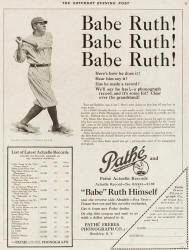 |
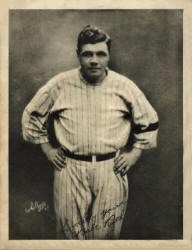 |
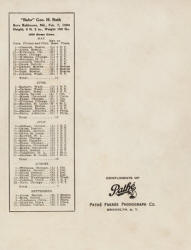 |
| The Saturday Evening Post Babe Ruth Record ad |
1920 Babe Ruth Pathe Actuelle photo premium |
1920 Babe Ruth Pathe Actuelle photo premium back |
|
|
|
The Babe Ruth Home Run
Story Record Monolog |
|
|
|
| |
Some words
in the monologue are inaudible and the text is
highlighted in red |
|
| |
Ladies
and gentleman, We before you.....no that's wrong. If
you say you have before you, your illustrious but very
humble servant, Babe Ruth. Did you know I'm a baseball
player and a specialist in home runs.
I made a record of
home runs and now I am making a record of quite another
kind. I hope you stand for it, and like it as much as
you did the others. As a matter of fact I am quite
unused to this sought of thing, I am more at home on
the diamond than on the disc. However they tell me that
I could do allmost anything when I'm really wound up.
They tell me also that the easiest thing in the world
to get wound up on a phonograph so, so here it goes.
I see by the papers
that Babe Ruth, that's me, is what is known by a
popular hero. One of the papers even refers to me as a
super man. I'm not quite sure what that is, but I often
fond myself in the soup, so perhaps that makes me a
super man.
But to return to that
popular hero stuff, it seems that the great big
American public likes to have a speech with popular
heroes. I haven't been able to deliver speeches on the
diamond, I've been too busy delivering wallops.
Thousands of fans have seen me swinging the stick, and
millions have seen my, my handsome face in the papers,
but might few have ever heard me make a speech so here
I am facing a phonograph horn for the first time in my
life, and believe me folks, I'd rather face the most
dangerous pitcher in the league.
I feel like making
this darn thing but if it were a bit of leather you'd
hear some concussion. I suppose you folks would want to
hear some real inside stuff about baseball and so a
short history of my life so. I was born when, quite a
little chap, in fact I was very little when I was born,
but (inaudible)
alright. I used to accompany my parents on their
evening walk. When they've thought I walked far enough,
they'd say now Babe run home. They said it to me every
night in those words run home, first put the idea of
home runs in my noodle, the rest was easy all I had to
do was just, join a big league outfit and they
expected me of home
runs. See how easy it was once having to made up my
mind.
But I don't know a game I go in, what's it called, the psychological frame
of mind. One thing this psychology, When my
psychological frame of mind meets the psychological
moment, the psychological wallop follows, that's how
it's done. I make it a rule never to miss an
opportunity of hacking another notch in that darn
old home run record.
unknown voice: What never Babe?
Babe: No Never
unknown voice: What Never?
Babe: Well hardly ever
But as I was saying, I'm not accustom to public
speaking, and folks I have to conserve my energy for
tomorrows game, and I guess you heard enough about my
smashing records. I supposin' if I don't quit you'd
want to smash this record. So, good bye and good luck. |
|
| |
|
|
|
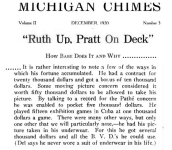 |
|
Excerpt from a December 1920 edition of the
Michigan Chimes. In 1920 Babe Ruth signed a
contract with the Yankees for $20,000., that
included a $10,000. signing bonus. Among other
endeavors to earn money Ruth was paid $5,000.
"by talking to a record for the Pathe concern"
Five thousand dollars is equivalent to
$62,572.75 in todays economy. Enough money to
drag Ruth from the Bronx, into Brooklyn where
the recording took place. |
|
|
|
|

